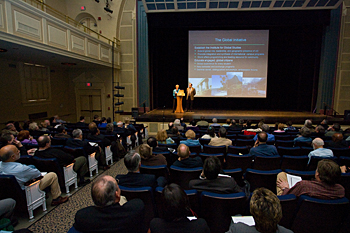
The first phase of the plan, the report from the Strategic Planning Committee, was unveiled Monday, April 7, at the semiannual General Faculty Meeting and may be read at the web site of the Strategic Planning Committee.
From now until May 10, Harker said he will continue his conversations with administrators and University trustees on priorities proposed in the committee's report. On May 10, he will respond to the report and announce his plans for the future of the University as part of a special daylong University Forum [www.udel.edu/forum].
Last fall, Harker asked the Strategic Planning Committee, co-chaired by Debra Hess Norris, chairperson of the Department of Art Conservation and Henry Francis du Pont Chair in Fine Arts, and Mark Barteau, Robert L. Pigford Professor of Chemical Engineering, to engage the University's different constituencies in conversations as a way to define the priorities for the future of the University. The committee hosted 115 constituent meetings, received more than 600 web submissions and presented its report to Harker at the end of March.
At the April 7 meeting, Norris and Barteau presented an overview of the report.
The 21-page report begins by noting that the University currently has the most talented faculty and students in its history and "building on the strengths of our heritage, we are poised to embrace the challenges and opportunities of the new century."
Four commitments are identified as being essential to the strategic initiatives that will propel the University to prominence: diversity, partnership, engagement and visibility.
The committee's report proposes six strategic initiatives that capture "the rich resources and the spirit of dedication to the University evident in the many inspired ideas that were contributed to this planning effort."
The initiatives are
- The 21st Century Research and Graduate Studies Initiative,
- The Initiative for Student Engagement and Learning,
- The Initiative for the Planet,
- The Global Initiative,
- The Initiative for Arts, Culture and Community Partnerships and
- The Professional Education Initiative.
Each initiative is described in a special section that includes specific recommendations. For example, the Initiative for the Planet includes among other recommendations the proposal that the University should become the Green University and "exemplify sustainability awareness and practice."
Among the report's other suggestions are to explore establishing a residential, four-year college in Sussex County; to look at ways to enhance and develop legal scholarship; and to work to increase the number of international students and scholars on the campus.
In their presentation at the meeting, Norris and Barteau noted that all the suggestions and ideas submitted to the committee are being gathered into a searchable database that will be made available to senior administrators, deans and chairpersons as a way of “capturing the good thinking that has already occurred.”
In concluding remarks, Harker noted that several topics touched on in the report are already being actively explored. He cited the recent appointment of David Brond as associate vice president for external relations as a step forward in the area of increasing the University's visibility, and also mentioned the appointment of a new Diversity Task Force, a press conference on April 10 announcing a forthcoming study that will measure the University's carbon "footprint” and the launch of the new sustainability web site.
Also at the General Faculty meeting, memorial tributes were read for Elizabeth Cloud, former associate professor emerita of the College of Health Sciences; Marguerite (Meth) Termini, former associate professor of the College of Health Sciences; John (Jack) O'Neill, former assistant professor and co-director of the Ice Skating Science Development Program of the College of Health Sciences; Richard Garvine, former Maxwell P. and Mildred H. Harrington Professor of Marine Studies; and Norman E. Collins Jr., former professor emeritus of bioresource engineering.
Photo by Kevin Quinlan

